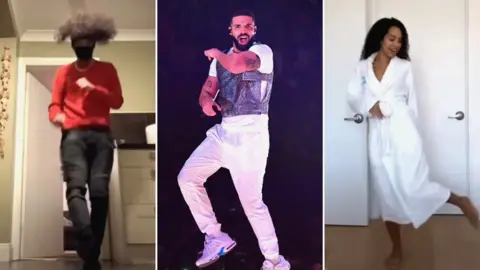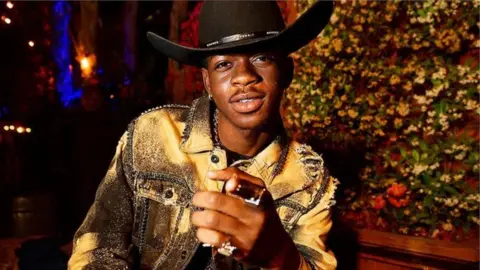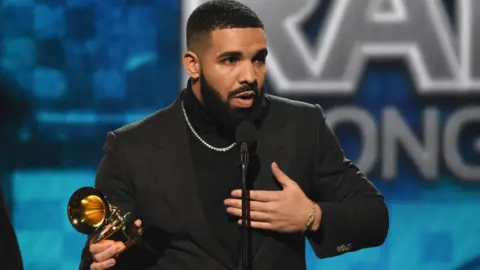How Drake harnessed TikTok to slide to number one
 Getty Images / TikTok
Getty Images / TikTokHow is Drake coping with life in lockdown? Fighting boredom by dropping dance moves, if the video for his new single, Toosie Slide, is anything to go by.
Beyond showing the rapper taking isolation seriously, donning a face mask and gloves while staying home like so many of us (admittedly from his astronomically large Toronto pad) it also introduces the track's namesake dance routine.
"It goes right foot up, left foot slide / Left foot up, right foot slide," he sings, while demonstrating the moves in his lobby.
Seemingly harmless fun - but for Maddy Raven of digital music marketing agency Burstimo, it doubles as a "fantastic" social media marketing ploy.
Drake's simple, easily-copied choreography is perfect for the new wave of video-based social media platforms, in particular Tik Tok.
Allow Google YouTube content?
The Chinese-owned social media app, in which users create 15-second clips, usually set to music, was second only to WhatsApp in global downloads last year.
With a billion users of its international version, it's increasingly established itself as a way for unknown artists to score a breakout hit - from Lil Nas X's Old Town Road, to Doja Cat's Say So and Arizona Zervas's Roxanne - in the same way that featuring in a television advert could supercharge an artist's sales in the pre-internet era.
"TikTok's an entirely new way of engaging, not only with your direct fanbase but anyone who wants to dance or show their creativity in short-form video," says Sammy Andrews, CEO of Deviate Digital, an advisory agency to the entertainment industry.
Allow Google YouTube content?
Drake himself alluded to this in December's single, War, chastising rappers who "spend too much time on [Instagram] captions, not enough time on action."
Shortly after he took his own advice, messaging internet-famous dancer Toosie a beat with some lyrics, and asking for help creating a routine. Four months on, the song has topped Billboard charts.
'Don't you want to dance with me?'
The star is no stranger to viral dance recognition. His awkward moves in the video for 2015's Hotline Bling spawned endless memes, while the track In My Feelings inadvertently sparked the 'Kiki challenge' of summer 2018. The Toosie slide, however, is noticeably more transparent about its ambitions.
Raven believes this is a dance partnership of self-interest, capitalising on Drake's dance pop-culture heritage, and taking new music directly to his young fanbase.
The majority of TikTok's users are aged between 16-24, firmly Gen Z - an audience with fragmented consumption habits, who rank Drake as one of their generation's most influential musicians.
Dance is also central to the platform's success - with routines like The Get Down, Renegade and Cannibal all going viral since parent company ByteDance absorbed lip-syncing app Musical.ly, (plus its huge database), in 2017.
Add to this TikTok's unique layout, which prioritises content discovery over subscriber clout, using an algorithm that learns from viewing preferences and therefore rewards retention rather than simply pushing popular content - and it's a stage that even a megastar like Drake, now 33, can't ignore.
"This is a new frontier for music discovery and music interaction," says Andrews. "Unlike many other apps people are actively seeking music to engage with, in ways that most have not on other platforms".
Toosie Slide is a "perfect example" of writing specifically for the platform says Raven. "Its straightforward lyrics provide clear instructions for a potential dance trend, even if it isn't publicly stated".
And it's a tactic that appears to be paying off. Two days after the video's release, views of Tik Tok entries submitted under the #toosieslide hashtag had already hit 20 million. A fortnight later, the tag has been viewed 2.4 billion times (including three attempts by Justin Bieber). That's a lot of eyes and ears by anyone's standards.
"Make no mistake every record label in the world is now actively looking for ways to utilise TikTok as part of a marketing campaign for a track," says Andrews.
Snowball effect
The hungry marketing push is part of a broader picture, as TikTok traction can often be a springboard for further success on mainstream music streaming platforms like Spotify and Apple Music.
Just last month The Weeknd's Blinding Lights started trending on TikTok and is "now chart-topping and one of his most streamed songs," explains Raven, helping him reach 64 million monthly listeners on Spotify for the first time in his career.
Allow Google YouTube content?
One of the most famous examples of TikTok's potential snowball effect is Nas X's Old Town Road. Prior to becoming a global country-crossover smash with Billy Rae Cyrus, the rapper's original version broke out on TikTok, with creators playing it in their videos as they transformed themselves into cowboys and cowgirls.
Its continued success saw Nas X go from a college dropout sleeping on his sister's floor to instigating a major label bidding war, ultimately signing to Columbia Records.
"I should maybe be paying TikTok," Nas X told Time magazine last year. "They really boosted the song."

Low-fi rapper Powfu has found similar viral success with his heartfelt, introspective track Death Bed (Coffee For Your Head), becoming a soundtrack to the lockdown.
It found popularity thanks to the Quarantine Cutie video series, which sees a man pull out all the stops to win over a girl he sees through the window while self-isolating, and has since spread across the internet.
After accumulating more than 100 million plays on various YouTube clips, the official video, released on 1 April, has already been viewed nine million times.
Tik, Tok, boom?
The bottom line of all this increased engagement is of course financial, with streaming now music's biggest money maker.
"We use TikTok as a means to first get the attention on the artist and ears on the music" explains Raven. TikTok's algorithm remains a closely-guarded secret, but a recent Rolling Stone investigation suggested royalties are paid per video upload containing the track - making a viral dance routine a standalone goldmine.
Further royalties then come "when the consumer is pushed to streaming platforms or the track gets enough traction to be played on radio rotation," she says.
Andrews is even aware of "some artists and labels changing the name of their tracks post-release if they've sparked mass fan uploads and dances on TikTok under other names to make them easily identifiable on streaming services".
There is, however, a looming concern that this could create a tsunami of commercial content - ultimately clawing the community's power away from organic creators and saturating the platform with big names and major corporations trying to go viral.
So where does Toosie Slide leave Drake? As a cultural behemoth of the last decade, is it a sign of the rapper adapting to new trends, or a superstar selling out his musical integrity to stay relevant?
Potentially both suggests Thomas Hobbs, a freelance music writer for Pitchfork and NME among others.
"Rappers can't ignore the boom of TikTok and I believe this single was designed to tap into that, more than quarantine. That was just a nice coincidence," he says.
"Like his idol Jay-Z, Drake knows how to tap into trends from younger artists to stay relevant."
 Getty Images
Getty ImagesBut, just like the 1960s artists who rushed out songs about The Twist, The Mashed Potato and The Loco-Motion to capitalise on then-contemporary dance crazes, Hobbs warns that Drake and other established stars need to be careful that they're "adding something vibrant to these trends and not just recycling them".
"If Drake once again follows a big commercial single with a lukewarm album that doesn't live up to the hype, then a lot of his fans could turn against him."
One such self-professed fan, Tobi Rachel, a culture writer and host of Yellow Cup podcast, suggests that while Drake can "get away with" the Toosie slide routine amongst the TikTok generation, she was left rolling her eyes as a long-term listener "from his mixtape days".
"I did chuckle at the fact he appeared bored in self-isolation like so many of us, but I believe it's the first and last time he should ever be so blatant because he won't get a pass again."
A clear warning that Drake's played his Joker card. But when better to bend the rules than during a global pandemic? Maybe we can let this one (Toosie) slide.

Follow us on Facebook, or on Twitter @BBCNewsEnts. If you have a story suggestion email [email protected].
